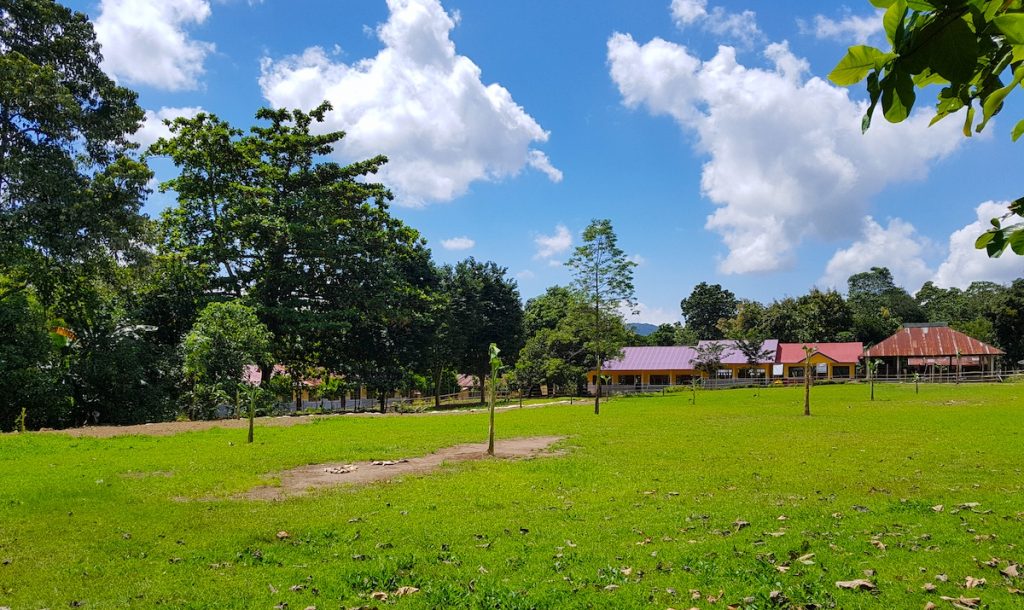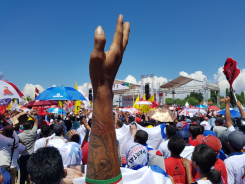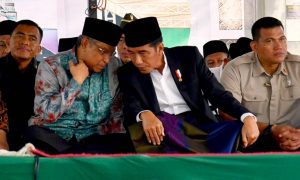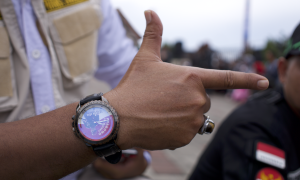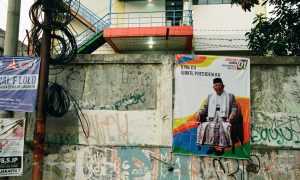In Flores, land is central to wealth and prosperity—which guarantees an important political role for those who own or control the use and distribution of land in society. In the past, members of the Austronesian tribes in Flores did not recognise the concept of landlord, but of land guardian (ine tana ame watu or mosalaki). After the introduction of private land ownership under Dutch and Japanese colonisation, land guardians in Flores—who traditionally only played a role in distributing land and solving problems related to it—proclaimed themselves as landlords (tuan tanah). Many took the opportunity to claim collective land as private property (though some did not). Yet all still had the authority to determine who could cultivate collective land.
In today’s democratic politics, the power and authority of landlords is often used to reap electoral support. Just as in other parts of Indonesia, standing for parliament costs money, and in Flores, landlords are among the few people who can afford to run a campaign. Local political party branches have tended to recruit landlords as their legislative candidates (calon legislatif, or caleg) to boost their votes at local, provincial or national levels.
Landlords are not shy about drawing on their economic and cultural power to influence voters. While campaigning in central Flores during the 2019 election, Rikus Niga,* a landlord and provincial parliament candidate from Golkar, told his constituents:
“I have huge land holdings and I thus could not cultivate the land by myself. I have helped you all by letting you cultivate my land for years. Today, I beg you to help me back. In order to help me, you only spend five seconds in the voting booth as I am running as a caleg in this electoral district (dapil). I request your help to vote for me on 17 April 2019. Isn’t it easy?”
[*all names marked with an asterisk have been changed to respect the anonymity of the informants and/or to protect the author’s safety—Ed.]
In an interview with me, Rofinus Ngawu,* a landlord caleg standing for a district parliament seat, proudly said:
“I have already had base votes (suara dasar) of around 500 voters from my tenants and some migrants (pendatang) in my village. I just need to look for 400–500 votes from other villages to secure a seat in the parliament.”
Such confidence was understandable. In previous elections, many landlord caleg easily won election to district-level legislatures (Dewan Perwakilan Rakyat Daerah Tingkat II or DPRD II) in central Flores. In 2014, for example, in my home district of Nagekeo, several landlord caleg won election to the DPRD. One of these men, Seli Ajo Bupu, reaped significant electoral support in his dapil (electoral district) of Boawae, where he was a major landowner. One of his constituents told me that “in the 2014 election, most tenants in Olakile and Nagerawae villages voted for Seli.” Florianus Papu—a landlord caleg who had just returned from working in Papua—won a seat in the district legislature with a significant electoral support from tenants in a neighbouring dapil in Mbay. Both Seli and Florianus became,respectively, the speaker and deputy speaker of Nagekeo’s DPRD.
In 2019, though, the election in Nagakeo provided a look at how the political culture of Flores is gradually changing, as a result of changes in the land tenure system as well as the growth of money politics in the last ten years. This year, many prominent landlord candidates failed to win seats in the local parliament. For example, Mauritzius Meze from PKB and Faustinus Ngebu from PDI-P—both respected landholders in Boawae subdistrict—were defeated in their attempts to enter parliament for the first time. In Mbay subdistrict, several landlord calegs such as Kalis Amekae, Florianus Papu and Arnoldus Ju Wea (the latter two both incumbents) also lost. In 2014, 12 landlords won a seat in the Nagakeo parliament, but in 2019 only 8 were elected—and some of those were incumbents whose campaigns now involved money politics. Overall, out of the 25 elected DPRD members elected in Nagekeo in April, there are 15 new faces.
These landlords were clearly shocked to lose their elections. Some reacted angrily: in Boawae subdistrict, four days after learning of his election loss, one respected landlord seized back land that his ancestors had surrendered to the Catholic church in the 1950s to establish a primary school. He fenced the football field and garden of the school. In the football field, he planted more than twenty banana trees [illustrated in the photo above—Ed].
Similarly, in Mbay, six days after the election, relatives of a failed landlord caleg closed two public roads with ten truckloads of earth and rocks after realising that they had lost. Another unsuccessful landlord caleg from Golkar stopped a family from burying their dead relative in the public cemetery in Mbay—which is located in the land of the caleg’s family—as they claimed they supported other candidates in the election. In Maunori one landlord, who stood for a seat from the Perindo party, and his relatives closed access to a spring on their land, which resulted in a lack of clean water access for the people there. Several weeks after the election, in Boawae, a failed landlord caleg from PDI-P evicted several tenants whom he knew didn’t vote for him in the election.
These negative reactions are not merely the result of losing in the election, but of the landlords’ being beaten by “migrant caleg” (caleg pendatang)—who had humiliated them in front of their constituents, especially tenants and migrants. Thomas Mega Maso from Nasdem—a local contractor and caleg pendatang from Boawae—won a seat in the Nagekeo DPRD from a dapil (electoral district) in the neighbouring urban area of Mbay. In Boawae, meanwhile, the landlord Mauritzius Meze was beaten by Lukas Y.M.P. Boleng, a local businessman and contractor whose father was from Eastern Flores. Lukas—who stood for election from Nasdem—even earnt the highest number of votes in his Boawae dapil (electoral district) and thus has the possibility of becoming a deputy head of Nagekeo’s parliament, since Nasdem finished in the second place in the district.
Campaigning in the shadow of Ahok in NTT
Fears of intolerant Islamic movements have intensified identity politics in Christian communities in the east.
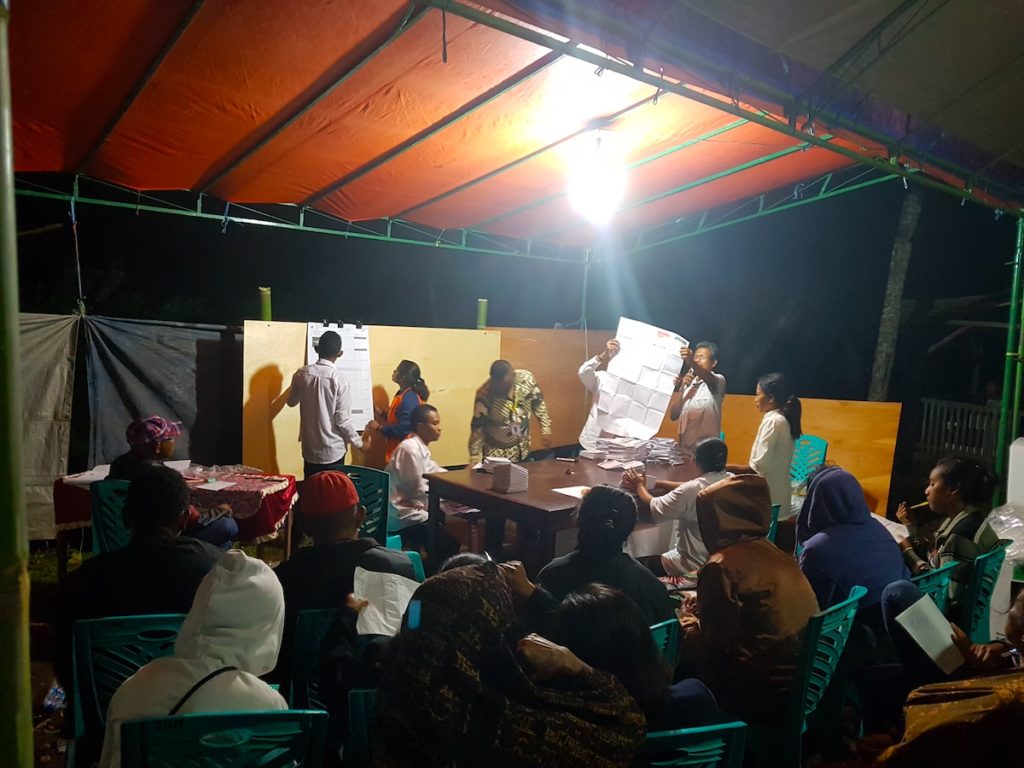
COUNTING VOTES ON ELECTION NIGHT, NAGEKEO (PHOTO: AUTHOR)
Money politics
Wealth in Flores—a poor island—is concentrated in the state. In Nagekeo district, for instance, an official in the district planning office (Bappeda) informs me that locally-generated revenues (pendapatan asli daerah) amounted to less than 4% of the total local budget in the last few years; the rest is provided by national government. This amount of funding is spent on routine government personnel expenditure (belanja pegawai) and infrastructure development projects.
The increase in government infrastructure projects, especially during Jokowi’s administration, has contributed to the growth of a new rich comprising local contractors, bureaucrats, politicians and businessmen. (Improved infrastructure and better transportation services connecting villages with cities, and Flores with Java, have helped those involved in private business, too.) As government infrastructure projects are prone to graft, they have also led to increasing wealth among senior bureaucrats and politicians. Senior bureaucrats can extract 10% from infrastructure projects administered by their offices. Politicians also do the same, as they usually have approval authority over certain projects. A local party official in Flores told me that “the head of local parliament usually gets 50 projects, his/her deputy 30 projects, and local parliamentary members 15–17 projects.” In each project, he said, contractors have to pay 10% of the total value of the project to politicians who ensure their bid wins during tender processes.
These new rich are competing to win political positions in local parliaments every election. This competition usually involves money politics so as to win the political positions and thus beat old political elites in Flores, especially from the landlord classes. Just like elsewhere in Indonesia, money politics is now commonplace. The landlords, however, have usually not been that involved in it, especially in their own villages. This is because they may think that, as in previous elections, they could win support by drawing on their traditional authority.
Moreover, although landlords in Flores possess more land than their fellow villagers, they are not really cash-rich, as they do not actively use their land to accumulate wealth like the capitalist classes. Most tenants—who are typically migrants or fellow clan members of the landlord—cultivate the land with very low payments, called fedho, in which the tenant gives a water buffalo every 15–20 years for cultivating one or two hectares of a landlord’s land. But tenants often cultivate their landlords’ land without paying anything, excluding giving contributions to adat (customary) rituals and ceremonies in the villages.
Candidates from the new rich, meanwhile, distribute cash and other material benefits to voters. A candidate might pay Rp250,000 to Rp300,000 (A$25–30) per vote to their constituents (a significant increase from previous elections, where the rate was around Rp50,000–Rp200,000). In a poor region such as Flores, this is considered a big amount of money: it can buy 20kg of rice to feed a family for two weeks. Money politics also takes the form of distributing other material such as calendars, clothes, wall clocks (jam dinding), and some more expensive items. A businessman in Flores who traded in coffins and water used to give free coffins and water in the months and years before the elections to his prospective constituents.
As it is said in Flores, a candidate who wants to win the election also has to offer not only a good vision (visi) and mission (misi), but also good gizi (food/nutrition) during their campaign. Candidates are used to slaughtering animals such as pigs, buffalo, sheep and cows to mobilise people during their campaigns. Campaign season in Nagekeo—which had a stunting rate of 39.8% in 2018, much higher than national level of 29.6%—is thus known as an opportunity for “improving people’s nutrition” (perbaikan gizi masyarakat).
Some landlord caleg now feel they cannot compete in this increasingly high-cost grassroots politics. In an interview, Rinus Wea,* a landlord caleg told me that:
“I lost in the election due to widespread money politics in Flores. Some candidates—especially those rich candidates such as two incumbent candidates Finus* and Nadus*—were involved excessively in money politics. Both Finus and Nadus are incumbent caleg, who were also helped financially by contractors who had got infrastructure projects from Finus and Nadus. I thought I would win the election as many of my tenants have worked for free in my land for many years in several places. To my surprise, in these places, many of my tenants voted for Finus and Nadus in the election as they have received money from both of them before the election. In this election, I did not involve in money politics as I do not have enough money to do so. One of my relatives in Jakarta wanted to help me with Rp200 million (A$20,000) so as to get involved in money politics. But I refused it as I thought I would easily win a seat in the parliamentary house. Moreover, money politics violates the regulations.”
Land certification
At the heart of the declining electoral fortunes of landlords is the changing nature of land tenure, something which has been aided by President Joko Widodo (Jokowi)’s policies. Since 2014, accelerating the process of land certification—“sertifikasi tanah”— has been one of the Jokowi government’s priorities across Indonesia, including in Flores. Through national programs such the National Agrarian Operations Project (PRONA), Jokowi planned to issue 21 million new land certificates to farmers between 2017 and 2019. The PRONA has helped the poor in Flores to certify their land for free, although it has had negative impacts in terms of increasing land tenure conflicts and land transaction irregularities in Flores.
Although in the past they did not certify their land (in order to avoid land taxes), people in Flores are now negotiating with landlords—who can give permits for individual ownership of land through land certificates—and encouraging local governments to certify their land as theirs. The Catholic Church has been an active participant, too: the Archbishop of Ende, Vincentius Sensi Potokota, has sent his priests from Ende to certify all of the Church’s land across Flores, especially those lands that have been surrendered by local landlords so as to establish churches and schools in the past. During a Sunday Mass in Boawae in June 2019, a priest—who came from Ende to certify church land—encouraged people to certify their land because, according to him, it “will be useful in 50 years to come for future generations” in dealing with landlords.
The public enthusiasm for land certification is emerging in the face of landlords’ opposition to certification programs being implemented within their collective land. Before the election, the promotion of land certification programs in Flores was challenged by some local landlords. In Lape, for example, landlords sent letters to the district office of the National Land Agency (BPN) to stop giving land certificates to people. One migrant from Mbay told me that: “we are furious with landlords who do not allow us to certify our residential land, although we have lived here for almost 40 years.”
With the land certificates in hand, people, including “migrants” (pendatang) and tenants in Flores have challenged landlords’ authority, including through the ballot box. Officially owning the land which they work gives them more autonomy in making decisions, not fearing the repercussions if their landowner does not win election any more, as they may have done in previous elections. With government land certification programs and active grassroots initiatives in support of the programs, the domination of landlord classes in the local politics may thus be gradually reduced in the future in Flores—unless landlord classes, too, become more involved in money politics.
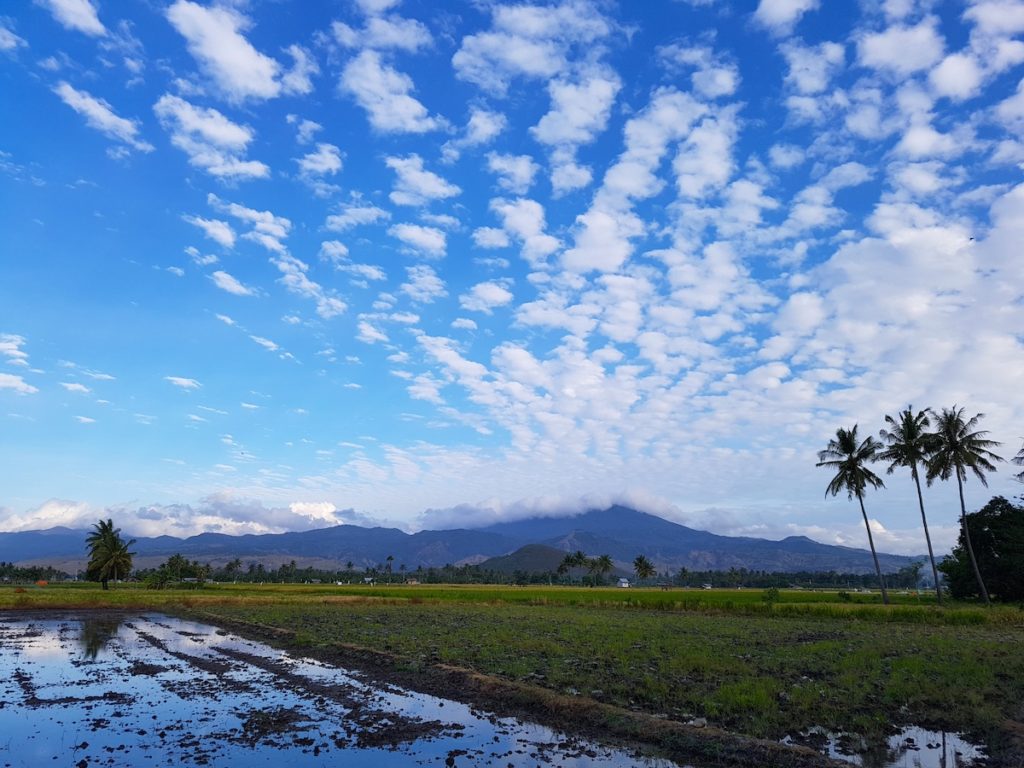
LANDSCAPE IN NAGEKEO. OWNERSHIP OF THESE THESE RICE FIELDS HAS BEEN “CERTIFIED” AND TITLES DISTRIBUTED TO VILLAGERS WITH GOVERNMENT ASSISTANCE (PHOTO: AUTHOR)
Good or bad signs?
The 2019 election made it clear how the political economy dynamics I have described here are increasingly shaping the outcome of local electoral contests in Flores. As land in Flores becomes more productive as the result of the availability of modern agricultural equipment, landlords are increasingly unwilling to give up collective land for legal private ownership through land certification, seeking to sustain their patronage power through control of land. Meanwhile, commoners and migrants are fighting for the land certification being offered by the government, so as to be free from this patronage politics.
At first glance, the reduction of landlords’ power within Flores’ political economy is a positive democratic achievement. Although people did not openly fight against negative reactions of landlord classes after their defeat in the election, those actions have just led to making many people in Flores become more furious towards the landlord classes. Some people I have spoken to recently say that they will not vote for those landlord caleg in the future elections as they, like the Prabowo camp, did not act democratically in responding to their electoral losses.
At the same time, the spread and increase of money politics will challenge the development of democracy in Flores in the years to come. The more money politics becomes intensified and widespread, the more the political sphere will be dominated by those with money, closing the door to the local politics for ordinary people who have personal capabilities but lack material wealth. Such conditions may prompt the landlord classes to get involved in money politics in future elections, which may in turn rationalise their using land so as to reap more economic benefit at the expense of tenants and migrants.
Thus, if the people of Flores want to be prosperous under electoral democracy, there need to be mechanisms to challenge the growing culture of money politics while sustaining the culture of collectivity—without feudalism—in Flores. Reforms such as distributing land certificates (which is widely misunderstood as agrarian reform) cannot solve the core problem of land inequality in Flores, as much of the land is concentrated in the hands of landlords. The government and the people of Flores need to pay heed to the power relations within the local agrarian society through introducing progressive policies, while continuing to strengthen the bureaucracy, state apparatus and civil society’s capacity to fight against money politics and corruption.
 Facebook
Facebook  Twitter
Twitter  Soundcloud
Soundcloud  Youtube
Youtube  Rss
Rss 